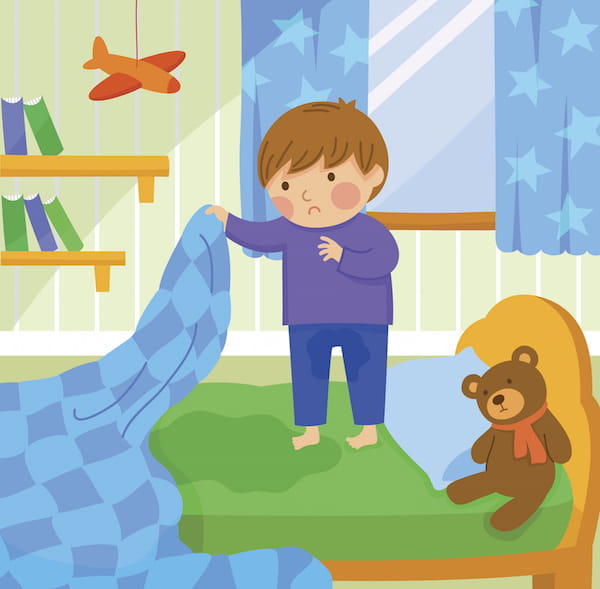What to do about bedwetting
You know the drill because it happens over and over and over again. You walk into your child’s room, and you can usually smell it before you even see it, and you think, “Uggh, he’s wet the bed AGAIN.” You start your day with the additional loads of laundry that you don’t have time for, a crying child who can sense your frustration and is overcome with embarrassment and the sinking feeling that you must be doing something wrong for this to continue happening.
If this sounds familiar, hang in there. Here are some things to know about bedwetting and some tips for getting it under control.
Bedwetting is really common
When these parenting challenges occur, sometimes it’s just helpful to know that you aren’t the only one struggling with this problem. Lots and lots of kids struggle with bedwetting, and the vast majority will outgrow it with age. Most kids will wet the bed during toilet training somewhere between two and four years of age, but it happens frequently even in older kids.
When we look at five-year-olds, one in five of them experience bedwetting. For seven-year-olds, this number is about one in 10. At 10 years old, roughly one in every 20 kids will still struggle with nighttime wetness. In other words, you aren’t alone.
What’s the cause of bedwetting?
 There likely isn’t just one cause, but there are many potential factors that can contribute. Here are a few that may affect your child:
There likely isn’t just one cause, but there are many potential factors that can contribute. Here are a few that may affect your child:
- She many not have learned yet how to hold and release urine effectively. It takes time for the brain to learn to communicate with the bladder to know when it is full and when it needs to empty.
- He is a deep sleeper and doesn’t awaken to the brain’s signal that the bladder is full.
- Bedwetting tends to run in families, so there may be underlying physiological reasons for it.
- Her bladder may be too small or not yet developed enough to hold urine all night long.
- He may be making an excess of urine during nighttime hours.
- She may be suffering from constipation. Full bowels put excess pressure on the bladder which could lead to overnight urination.
- He may be experiencing a period of stress or illness.
What you can do about it
Know that this problem isn’t going to be cured overnight. It’s a marathon, not a sprint, and if you’re going to finish this race well you have to adopt the right posture to deal with it.
- Don’t blame your child. It’s not anyone’s fault, and shaming them will backfire every time.
- Focus on the positive and offer encouragement. Offer rewards for successes (however small) instead of punishment for failures. Be an ally for your child in the struggle instead of an adversary.
- Talk to your child openly and honestly about the problem. Let them know it’s an issue and you want to work on it, but it’s not their fault and you will address it together.
- Protect the mattress with a waterproof cover to minimize damage.
- Don’t allow your child to drink caffeinated beverages, whether day or night.
- Don’t allow teasing or making light of this problem in your family. Protect your child’s integrity and don’t allow them to feel shamed or belittled because they struggle with this problem.
- Adopt a strategic nighttime bathroom routine and stick with it: minimize the amount of fluids your child drinks in evening hours, have them go potty just before getting in bed, and consider waking them up one to two hours after they’ve gone to sleep to potty in order to stay dry the rest of the night.
If you’ve implemented these changes in your household for several weeks (up to 3 months or so) and you haven’t seen improvement, you may consider some other options. It’s possible that a bedwetting alarm could help. This alarm signals a child to wake up at the first sign of wetness, and can help a child learn to respond to their body’s cues better in the middle of the night. Some types of medications may also be helpful in older kids, but only after you’ve exhausted all of the things you can do at home.
When to seek help
While the majority of kids will outgrow this problem over time, there are some instances where bedwetting can indicate a medical problem. If your child is toilet-trained and has been free of bedwetting for six months or more before the problem surfaced, there could be something else going on.

If you notice any of the following, contact your pediatrician right away.
- An abrupt change in frequency of daytime urination as well as nighttime bedwetting
- Pain or burning during urination
- Cloudy or pinkish-colored urine or blood stains in underwear
- Changes or difficulty in the way the child is walking
- Constant dampness in the undergarments
- Inability to stop the flow of urine after urination; a constant dribbling or flow
- Sudden change in personality or mood
If you’re concerned about bedwetting, enlist the help of your pediatrician. Beyond detecting a medical problem, your doctor can be your greatest asset in working through this problem in your family. You need support and guidance if this is going to be a long-term issue, and your child’s doctor has the experience and expertise to guide and encourage you along the way. Don’t be afraid to ask for help!







